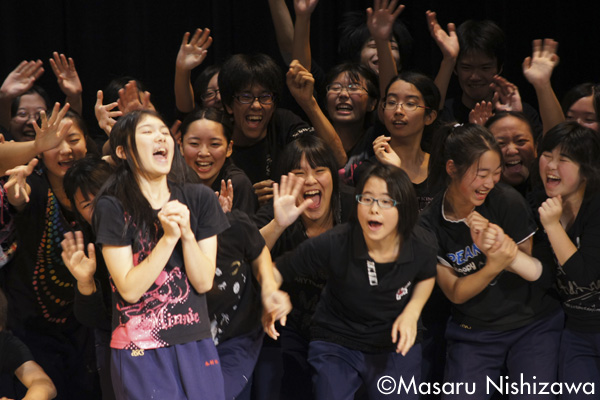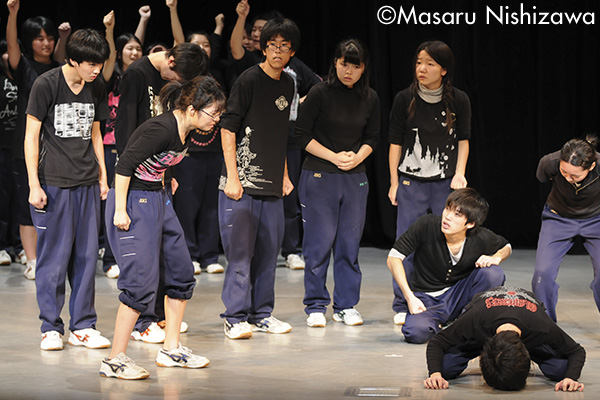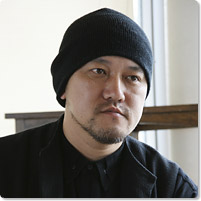Before the start of the play, the actors are gone through their warm-up exercises in front of the audience. At the start of the play, the team lines up and sings the Song of the National High School Baseball Championship, Glory Shines on You.
In the first scene we see the after-school practice of the seemingly unmotivated baseball team. The aspiring new managing assistant, Erika criticizes the members of the team who are quitting practice early, but no one pays any attention to her, even the senior manager, Shiori.
In the school hallway during lunch break Erika is trying to solicit new recruits for the baseball team. As everyone just walks by ignoring her, one boy is watching her from a distance. He is Kazusa, a student who has recently transferred to the school from a town that was devastated by the Great East Japan Earthquake and Tsunami. Knowing that Kazusa is a former baseball team player, Erika waits to approach him suddenly and asks him to join their team, but Kazusa avoids her and runs off.
The scene changes to baseball practice again. Erika stops the team captain, Shoyo and the others to tell them that Kazusa might join the team, but they ignore her and again end practice early. Erika remains alone, raking the pitcher’s mound. Kazusa comes up to her and begins to talk, saying that his friends on his former baseball team were killed in the tsunami and that he feels it would be wrong if he were the only one to go on playing.
Erika begins to tell him about her father, who was a javelin thrower. Wishing to be like her father, Erika took up the javelin too. They agreed to train hard and try to make the Olympic team together. But, suddenly her father died of an illness. After that Erika injured her throwing shoulder badly and had to quit the javelin. “The people who can still throw should carry on for the sake of the people who can no longer throw, shouldn’t they?” she tells him. Hearing this, Kazusa decides to join the baseball team.
Now, all the team need is a coach. Shiori says she thinks she knows a good person for the job. She surprises everyone, though, when she shows up with her grandmother Aino, who is an Itako shaman. To the stunned team, Aino promises that with the powers of the Itako they can make it to the Koshien national championship tournament. However, she tells them, in order to acquire those powers they have to spend a month of harsh training in the mountains. That scares off most of the team but Kazusa says he will do it.
A month later, Kazusa and Aino return. In front of the team he shows his newly acquired power called Hotokeotoshi (spirit possession, the ability to become a medium and take in the spirit of a dead person). In his state of possession Kazusa is able to pitch amazing fastballs. The spirit possessing him is that of Eiji Sawamura, a famous pitcher from before World War II who became injured as a soldier and unable to pitch as before, and finally died in battle as disillusioned soul. The excitement of seeing Kazusa pitch brings the team together with new determination.
In the qualifying tournament the team’s winning streak continues.
On the night before the final qualifying game Erika comes to Kazusa and Shoyo’s room. Shoyo leaves to let the two talk. Kazusa tells Erika that the reason he chose to train as an Itako was in hopes of being able to be with his dead friends once again to do the thing they liked best just one more time.
The final game has begun. The other team is trying to break down the tiring Kazusa with a series of bunts. The endless tie game goes into the 15th inning. Kazusa’s body has reached its limit and he can no longer hold the spirit of Sawamura. Sawamura’s spirit departs, finally able to enter the Buddhist heaven. No longer possessed, Kazusa returns to his former self, and his teammates encourage him to pitch with his own pitches. But they are no match for the other team’s batters and in the end Kazusa and the team lose by 15 runs.
Summer vacation has ended and once again Aino and the baseball team are gathered at the school field. When Kazusa arrives the whole team begins the act of Hotokeotoshi to enter the trance and be possessed by spirits. For the past month they have all undergone the training of Itako shamans. The spirits they have summoned to possess them are those of Kazusa’s former teammates and coach who died in the tsunami. Aino takes in the spirit of Kazusa’s late mother.
Surrounded now by his familiar old friends, Kazusa is in tears as he apologizes to them, saying that he had forgotten them while he was playing hard with his new team. His former teammates gather around and praise him for the tremendous job of pitching he did. They have come to fulfill his wish. His wish was to play baseball with them just one more time. Together they begin to play.




